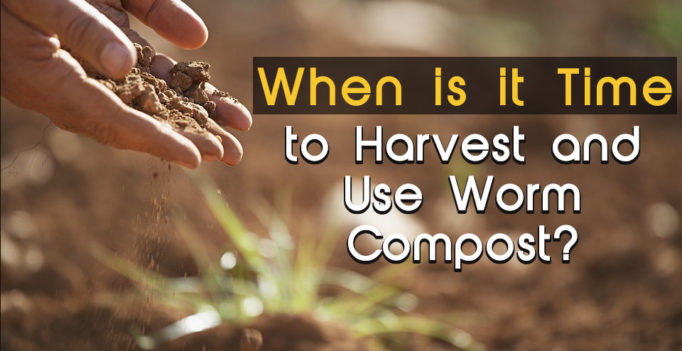A little too early and you are ineffective. A little too late and your window is closed. When it comes to harvesting and using your valuable worm compost, timing is everything. The good news is that we’re talking about a window that opens regularly from spring through fall.
By the time you finish this article, you’ll be able to anticipate those open windows. You will have learned to read the signs that say HARVEST ME as well as those that say FEED ME. And though these cues take some watching and waiting for, you’ll see that it’s worth it for the payoff.
Are We There Yet?
Sure, you can reap a rewarding harvest of all-natural fertilizer. But not until your worms have finished their work. And yes, your garden plants will grow strong and bear much fruit. But only if you use the good stuff at the right time and place. So, how do you know when that is?
Like most creatures, red wiggler compost worms behave according to the conditions of their environment. Their eating, digestive rate, and reproduction all vary as temperatures, pH, and humidity rise and fall.
In general though, as a rule of thumb, a fully-functioning population of worms can “finish” a load of compost every 3 months. That is how long it takes for most of the food and paper waste you add to be transformed into nearly ready-to-use fertilizer.
When is worm compost ready to cure?
Once harvest time is in sight, feedings are temporarily stopped or relocated. Without new food, the moisture level drops and worms begin to evacuate. This begins the curing (finishing)process.
Using a rotating tray system like the Worm Factory 360 makes this process particularly simple. All it takes is a sweet piece of old fruit in the tray below. Worms quickly and easily slip down and out of the curing tray by way of the grated bottom.
This initial curing period lasts only until your worm compost is just dry enough to sift and use. Sifting through a grate makes for a consistent product that is finely textured, loose, and easy to apply.
As it ages in proper conditions, microbial activity will flourish and it will continue to cure. With a long-lasting shelf life and great versatility, growing and harvesting your own fertilizer is definitely the way to go!
Heads Up
I’ve gotta stop here and give you a quick heads up. Maybe it was to be expected, but it surprised me. The volume of what you’re working with significantly decreases during this process. The loss of water and loss of worms really shrinks your yield quickly! But even still, it’s really satisfying to run your fingertips through that black gold and dream of what it will do for your garden.
Want to learn how to harvest your worm compost with nothing more than the Worm Factory 360 you raise them in? Go for it! That system has been my go-to since I discovered it!
When is it Go-Time in the Garden?
Ahead of Time
- Late fall when you can cover with leaf mulch and set the garden to rest.
- Early spring when preparing garden beds for planting.
These applications increase the amount of microbial activity and growth in the soil. As they populate the soil, new healthy cycles may begin. With each addition of worm compost, your garden soil structure and quality improves. Plants take root, grow, and show by their vigor what is in the soil below.
On Time
- With each individual planting.
After digging a hole for a new planting worm compost can be mixed right into the soil used to fill the hole back in. This will help urge new roots to reach out for those nutrients and become quickly established.
In Time
- When you are expecting rain.
- When a plant is in flower or setting fruit
Keeping weather and growing cycles in mind is all part of being a gardener. Knowing how the weather will affect exposed worm compost is important. Rain washes nutrients into the soil. That means a quick sprinkle on top of the soil will quickly be absorbed. That makes feeding really quick and easy!
Another part of being a gardener is being attentive and responsive to your gardens’ nutrient and hydration needs. Plants benefit most from a healthy boost of nutrients:
- When starting out
- When setting fruit
- When flowering
At any or all of these points along your garden’s growth, using some form of worm compost gives you the greatest reward.
No Time
- When worm compost would be quickly scorched by sun and heat.
- When worm compost would freeze before the soil could reap its benefits.
Switch to a tea application once root systems are established and the soil is too parched to easily work with.
Have at It
Now you know the signs and characteristics of finished worm compost. You also know just when and how your garden can gain the most from it. Be on the lookout for opportunities to enjoy the real fruits of worm composting!
Ready to enjoy all the benefits of worm composting at home? Be ready when the garden says, FEED ME! The Worm Factory 360 is a great all-in-one system, designed to raise your worms AND harvest with ease whenever the time is right.


How do you use the vermicompost if you can’t put it in the soil since it will turn hard as a rock quickly?
I believe that if it is kept in a container that is covered only with a few moistened layers of newspaper, it can last for quite a while. An airtight container allows anaerobic bacteria to grow and turns the whole deal into a smelly mess. If it needs a bit of extra moisture, add a little water but not enough to make it muddy. Just enough to make it feel moist. Keep the container in a place like a shed or garage protected from the elements.
Hi John. Thanks for your question. If you mean that your soil is too hard to incorporate the worm compost into, a worm compost tea will be perfect for you. The liquid nutrients will still seep into the hardened soil to provide many of the benefits you’d get from turning it under instead. Otherwise, I suggest holding on to your compost until the soil loosens up. Then you can add it right in. Well-preserved worm compost provides similar benefits to “fresh”.
Thank you for sharing your knowledge. I’m a beginner, but have already noticed the improvements in my garden!
How long are the worm castings good for after you harvest ?